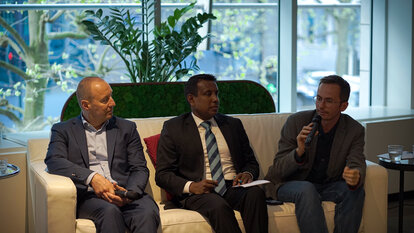Born With Pride
International Conference Addresses LGBTQIA+ Rights in South Asia and Europe

Panel Discussion on Being Queer and LGBTQIA+ in South Asia and Europe
© FNF EuropeBrussels, April 9, 2024 - The intersection of LGBTQIA+ rights and legislative reform took centre stage at a landmark event held in Brussels on April 9th, 2024. Organized by the Friedrich Naumann Foundation for Freedom (FNF) South Asia and European Dialogue, the conference brought together leaders, policymakers, and activists from across South Asia and Europe to discuss the progress and challenges facing the LGBTQIA+ community. The event commenced with the release of comprehensive papers examining the status of LGBTQIA+ rights in both regions.
Across South Asian nations, the landscape of legal recognition for LGBTQIA+ communities varies significantly, with some countries making commendable strides in decriminalization and formal acknowledgment of same-sex relationships. The legal recognition of transgender rights in Bangladesh, India, Nepal and Pakistan and steps towards the decriminalization of homosexuality in Bhutan, India, Nepal and Sri Lanka are such examples of progressive trends. However, persistent challenges loom large, particularly in jurisdictions like Afghanistan and the Maldives, where interpretations of Sharia law impose severe punishment up to the death penalty, hindering progress in LGBTQIA+ rights.
While transgender rights have been legally recognized in most South Asian countries due to the cultural and religious significance of the so-called Hijra community, the protection of gay rights are lagging behind. Thus Nepal is the only country with protection against legal discrimination and is together with Bhutan the only country which has taken steps to decriminalize homosexual activities. Premnath Dolawatte, a MP from Sri Lanka, who participated in the Brussels conference is aiming to change this as he introduced a bill in the Sri Lankan parliament to decriminalize homosexual activities and to abandon the colonial-time sodomy law. Mr. Dolawatte shared insights into his legislative efforts in Sri Lanka, expressing optimism for future reforms, stating: stating, "Collaboration with international partners is paramount. Together, we can create a more inclusive society for all.". Mr. Michael Kauch, a Member of the European Parliament from the Renew Europe Group, emphasized the evolving landscape of LGBTQIA+ rights, highlighting both progress and persistent challenges. Mr. Kauch also lauded recent legislative reforms in Germany while acknowledging the ongoing struggle for equality across Europe, concluding about the conference "events like these serve as vital platforms for fostering dialogue and collaboration on a global scale."